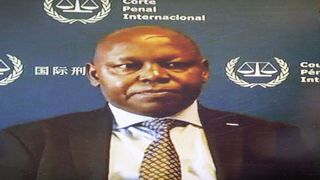
Kenyan lawyer Paul Gicheru makes his first appearance before the ICC on November 6, 2020, before Judge Reine Adélaïde Sophie Alapini-Gansou of Pre-Trial Chamber A.
| Pool | AFPNews
Premium
Gicheru allowed to access evidence against him in ICC case
The pre-trial chamber of the International Criminal Court has opened the way for Kenyan lawyer Paul Gicheru to access evidence against him in the witness tampering charges he is facing.
Single judge Reine Adélaïde Sophie Alapini-Gansou on Monday set the ground rules for evidence disclosure by both the prosecution and defence ahead of the March 15, 2021 deadline for filing of written submissions in place of open-court confirmation-of-charges hearings.
The setting of the rules for disclosure comes as Mr Gicheru and the prosecutor are battling to have the current proceedings continue uninterrupted against opposition by the Office of Public Counsel for the Defence (OPCD) to have the process start afresh with a new chamber composed of three judges instead of the current one.
Both Mr Gicheru and prosecutor Fatou Bensouda have opposed OPCD’s request to appeal an earlier ruling that determined that the pre-trial chamber was properly constituted for the purposes of the current confirmation of charges stage.
“OPCD claims that it has standing to seek leave to appeal because, in its view, Mr Bett ‘would have the right to seek leave to appeal’ — and, in his absence, ‘it falls on the OPCD to continue the standing it has already been granted to represent and protect Mr Bett’s interests’. Yet this not only overlooks the Appeals Chamber’s authoritative guidance, but also that the case against Mr Gicheru has been severed from the case against Mr Philip Kipkoech Bett — who remains a fugitive from the court,” Ms Bensouda told the court in opposition to OPCD’s request for leave to appeal.
For his part, Mr Gicheru told the court to reject the request for appeal because “OPCD lacks standing.”
Since he surrendered to the ICC on November 2, Mr Gicheru has appeared to be in a rush to have the case against him proceed without hindrances, often aligning himself with the prosecution’s position on procedural matters.
The prosecution has recognised this as well, with Ms Bensouda remarking that granting the OPCD’s request “would impede the prompt resolution of pre-confirmation proceedings in this case, contrary to the apparent wishes of Mr Gicheru….”
Regarding the ground rules the judge set on Monday, since there will be no open-court confirmation hearing, the parties have until March 15, 2021 “at the latest” to file written submissions.
Ahead of the filing of the written submissions, the prosecutor will be required to file a document containing a detailed description of the charges and a list of evidence no later than 30 days before March 15, 2021.
Mr Gicheru is accused of committing offences against the administration of justice in or around 2013 in Kenya consisting of corruptly influencing witnesses of the prosecution who were to testify against Deputy President William Ruto.
He faces a maximum of five years in prison, a fine, or both, if found guilty.
He surrendered to the ICC on November 2, 2020 after five years as a fugitive.
“If the prosecutor intends to amend the charges or the list of evidence, rule 121(4) of the rules requires that the defence be notified of the amended charges and/or list of evidence no later than 15 days before the date of the hearing, or, in the present case, the date of the filing of the written submissions,” the judge stated in the decision.
Mr Gicheru will also be required to provide a list of evidence, if any, not later than 15 days before the date of the filing of the written submissions.
But the parties do not have to wait for the deadlines for disclosures, according to the judge.
“The Chamber, therefore, expects the parties to fulfil their disclosure and communication obligations as soon as possible.
“The Chamber stresses that it is desirable to commence entering into the record of the case all the evidence that has already been gathered and which does not require translation or redaction, as well as evidence already presented to the chamber in support of the prosecutor’s request to issue a warrant of arrest.”
Like in the past Kenyan cases, the evidence that will be disclosed will have the names of witnesses redacted, and assigned pseudonyms.
Mr Gicheru is accused of committing offences against the administration of justice in or around 2013 in Kenya consisting of corruptly influencing witnesses of the prosecution who were to testify against Deputy President William Ruto.





